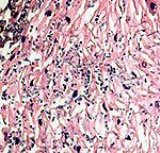
Esophageal candidiasis
Encyclopedia

Esophagus
The esophagus is an organ in vertebrates which consists of a muscular tube through which food passes from the pharynx to the stomach. During swallowing, food passes from the mouth through the pharynx into the esophagus and travels via peristalsis to the stomach...
by Candida albicans
Candida albicans
Candida albicans is a diploid fungus that grows both as yeast and filamentous cells and a causal agent of opportunistic oral and genital infections in humans. Systemic fungal infections including those by C...
. The disease occurs in patients in immunocompromised states, including post-chemotherapy
Chemotherapy
Chemotherapy is the treatment of cancer with an antineoplastic drug or with a combination of such drugs into a standardized treatment regimen....
and in AIDS
AIDS
Acquired immune deficiency syndrome or acquired immunodeficiency syndrome is a disease of the human immune system caused by the human immunodeficiency virus...
. It is also known as candidal esophagitis or monilial esophagitis.
Clinical presentation
Patients with esophageal candidiasis present with odynophagiaOdynophagia
Odynophagia is painful swallowing, in the mouth or esophagus. It can occur with or without dysphagia, or difficult swallowing....
, or painful swallowing. Longstanding esophageal candidiasis can result in weight loss
Weight loss
Weight loss, in the context of medicine, health or physical fitness, is a reduction of the total body mass, due to a mean loss of fluid, body fat or adipose tissue and/or lean mass, namely bone mineral deposits, muscle, tendon and other connective tissue...
. There is often concomittant thrush
Candidiasis
Thrush redirects here. For the hoof infection see Thrush .Candidiasis or thrush is a fungal infection of any of the Candida species , of which Candida albicans is the most common...
.
Some patients present with esophageal candidiasis as a first presentation of systemic candidiasis
Candidiasis
Thrush redirects here. For the hoof infection see Thrush .Candidiasis or thrush is a fungal infection of any of the Candida species , of which Candida albicans is the most common...
.
Diagnostic testing
Patients where esophageal candidiasis is suspected should undergo esophagogastroduodenoscopyEsophagogastroduodenoscopy
For other expansions of the initialism "OGD", see the disambiguation page.In medicine , esophagogastroduodenoscopy is a diagnostic endoscopic procedure that visualizes the upper part of the gastrointestinal tract up to the duodenum...
if it is safe to do so. Endoscopy often reveals classic diffuse raised plaques that characteristically can be removed from the mucosa by the endsocope. Brushing or biopsy
Biopsy
A biopsy is a medical test involving sampling of cells or tissues for examination. It is the medical removal of tissue from a living subject to determine the presence or extent of a disease. The tissue is generally examined under a microscope by a pathologist, and can also be analyzed chemically...
of the plaques shows yeast
Yeast
Yeasts are eukaryotic micro-organisms classified in the kingdom Fungi, with 1,500 species currently described estimated to be only 1% of all fungal species. Most reproduce asexually by mitosis, and many do so by an asymmetric division process called budding...
and pseudohyphae by histology
Histology
Histology is the study of the microscopic anatomy of cells and tissues of plants and animals. It is performed by examining cells and tissues commonly by sectioning and staining; followed by examination under a light microscope or electron microscope...
that are characteristic of Candida species.
Therapy
The current first-line treatment is a single dose of fluconazoleFluconazole
Fluconazole is a triazole antifungal drug used in the treatment and prevention of superficial and systemic fungal infections. In a bulk powder form, it appears as a white crystalline powder, and it is very slightly soluble in water and soluble in alcohol. It is commonly marketed under the trade...
(750mg). Other therapy options include:
- nystatinNystatinNystatin is a polyene antifungal medication to which many molds and yeast infections are sensitive, including Candida. Due to its toxicity profile, there are currently no injectable formulations of this drug on the US market...
- other oral triazoles, such as itraconazoleItraconazoleItraconazole , invented in 1984, is a triazole antifungal agent that is prescribed to patients with fungal infections. The drug may be given orally or intravenously.-Medical uses:...
- caspofunginCaspofunginCaspofungin is an antifungal drug, the first of a new class termed the echinocandins from Merck & Co., Inc. It shows activity against infections with Aspergillus and Candida, and works by inhibiting the enzyme β-D-Glucan synthase and thereby disturbing the integrity of the fungal cell wall...
, used in refractory or systemic cases - amphotericin, used in refractory or systemic cases

